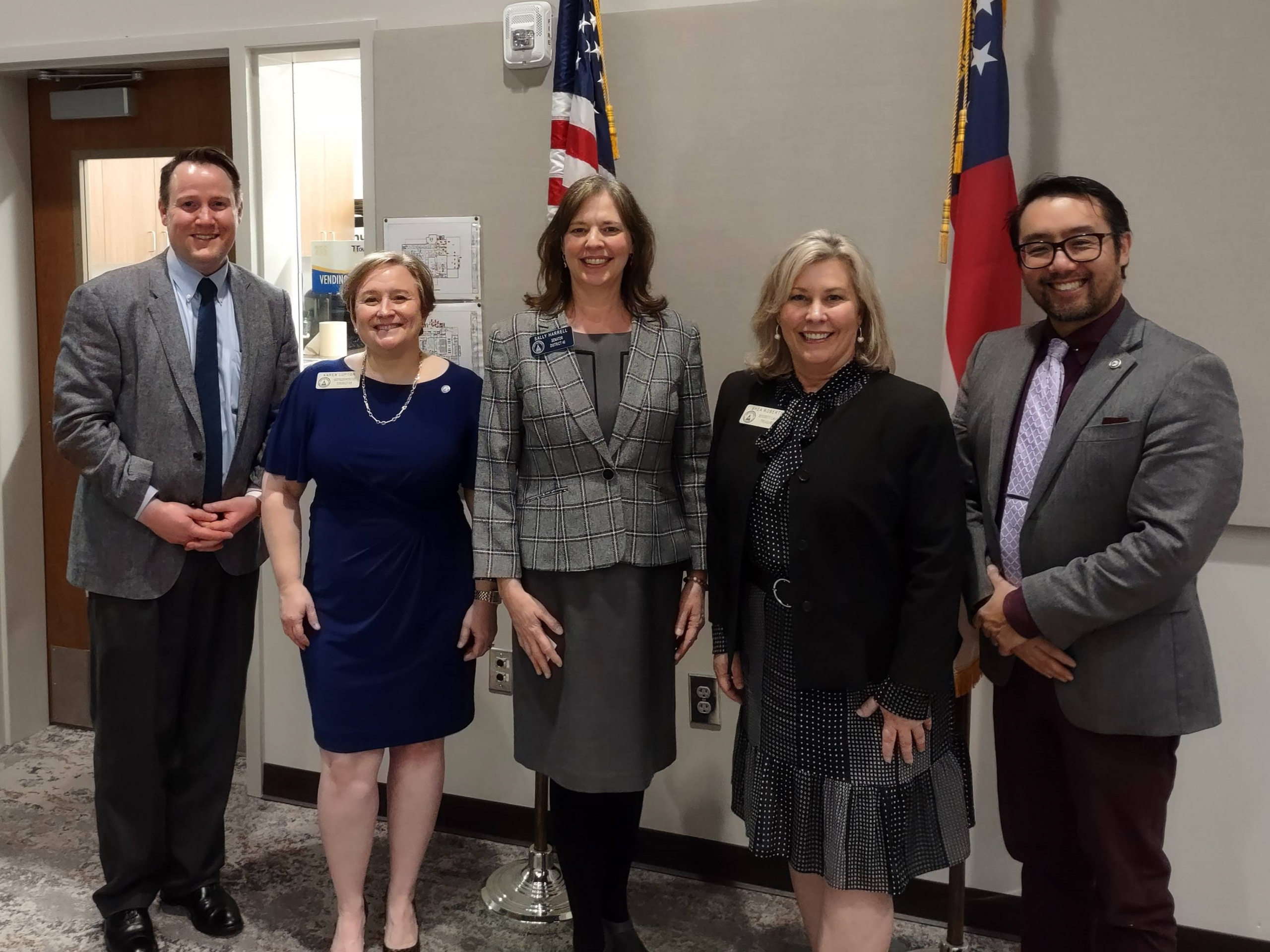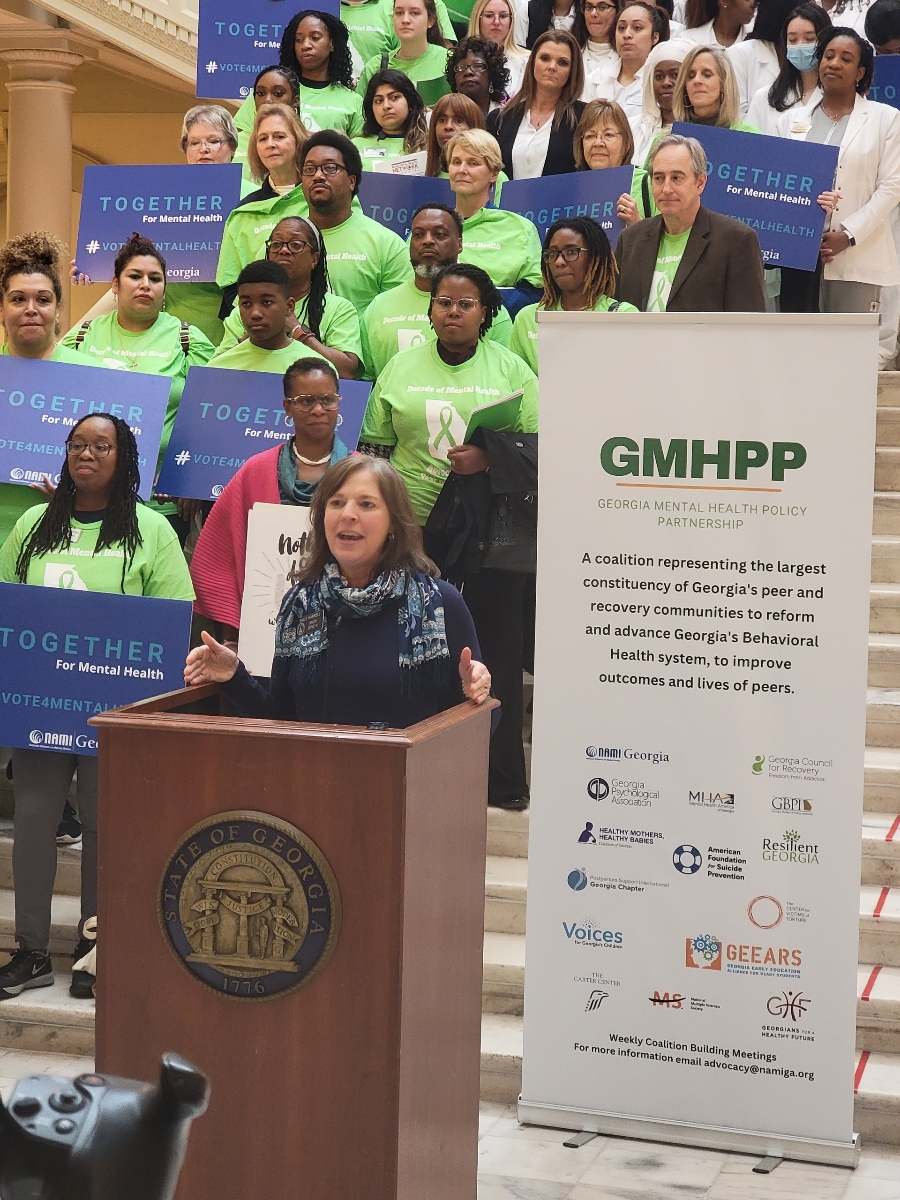Flash Flood Warning
I wasn’t in the mood this week to listen to Majorie Taylor Greene address the Senate about transgender youth, so I sought solace outside the chamber. Caught up in the moment, I completely forgot the Senate Page Program has been reactivated, so instead of quiet, I was swamped by a flood of people waiting behind the ropes for legislators to come speak with them. They were very glad to see me!
And since the House has not reinstated their Page Program, every single person in the Capitol that day who wanted to speak to a legislator was standing right there outside the Senate chamber. There’s no escaping to higher ground when your job is to be the voice of the people, so I embraced the moment. It was time well spent.
A sign outside the Capitol reads that indoor capacity is limited to 800 people. I stopped to ask the State Troopers at the security desk if they actually count the people. They laughed because they had just been discussing the “800 people” sign, and said they were certain there had already been more like 8,000 people through their security gates.
The dam has broken not just with people, but also with bills. Legislative Counsel, the staff of lawyers who draft bills, has a white board in their office where they record the number of bills they have drafted. It’s now well over 2,000. This means that going forward, despite our slow start, there will be longer floor sessions, lots of committee meetings, and 12-hour days.
Republican Crime Narrative Doesn’t Hold Water
Atlanta Mayor Andre Dickens visited with the Senate Democratic Caucus this week and contradicted Republican claims of rising crime. Mayor Dickens reported the good news that violent crime — crimes against people, for example rape and aggravated assault — in the City of Atlanta is down 7%.
One initiative helping this positive trend is a program called “Cure Violence” that originated in Chicago and was brought to Atlanta in 2020. In neighborhoods with high gun violence, trusted members of the community disrupt the cycle of violence by helping the community heal after a shooting, or intervening to prevent retaliatory violence. Sometimes these interventions happen in hospitals where gun violence victims are brought and the conflict continues in the emergency room.
Getting Washed Away: Criminal Justice Reform
Senate Republicans passed one of the worst “tough on crime” bills yet this week. Senate Bill 63 requires cash bail for more than 60 crimes, including misdemeanors like criminal trespassing and reckless driving. The vast majority of people arrested for these crimes can’t afford cash bail, so they await trial in jail for days, weeks, or months, often causing them to lose their jobs, parental rights, or even their homes.
Every time we vote on crime bills, I think of former Governor Nathan Deal, who was spotted at the Capitol this week. These bills are unraveling his legacy of criminal justice reform. It was Governor Deal’s Criminal Justice Reform Council that reported that even just spending two or more days in jail before trial increases recidivism by nearly 40%.
A Hemp Bill Almost Floats Past
This week, SB 22, a bill requiring chemical testing of post-market consumable hemp products, was a prime example of what can go wrong with hastily written floor amendments and fast moving parliamentary moves.
An amendment to SB 22 tried to ensure that Delta-8 was included in the list of substances to be tested, along with Delta-9. Delta-8 and Delta-9 are both compounds in cannabis plants that produce the “high.” Delta-8 is considered to have milder effects than Delta-9, but during debate, we learned that a few Senators had tried Delta-8 gummies and found it to be “plenty” potent.
In the middle of voting for SB 22 as amended, Sen. Josh McLaurin (D) asked, “Mr. President, isn’t it true that as amended, this bill now BANS Delta-8?” The bill narrowly passed, but we were suddenly confused about what we had just done. Sen. Kim Jackson (D) moved to reconsider the bill which put it at the bottom of the calendar for the next day. The bill author then moved to table the bill which moved it to the Rules Committee. I expect a more thoughtfully amended bill to be back on the floor soon.
Greater Truck Weights Would Erode Georgia Roads
This week we held elections for the State Transportation Board, which has 14 members — one from each Congressional District (CD). Each member serves a 5-year term and is elected by General Assembly members representing constituents in that CD. This year’s election focused on odd-numbered districts, so in District 7, we elected former state Senator Curt Thompson who will join the Board as a new member.
One issue on the Georgia Department of Transportation’s (GDOT) radar is increasing truck loads. GDOT Commissioner Russell McMurray briefed the Democratic Senate Caucus about SB 165 and HD 189, companion bills that increase truck weights allowed on Georgia roads to 90,000 lbs as a potential solution to our supply chain issues.
The problem is that Georgia’s roads and bridges aren’t built to withstand those loads. It could turn 20-year pavement into 12-year pavement and cost the state billions of dollars to strengthen our roads and bridges. Federal law limits trucks to 80,000 lbs, so heavier trucks wouldn’t be able to use the interstates which could mean more truck traffic on state and local roads. Later in the week, I heard that the House bill may ultimately be amended to limit greater truck weights to certain industries and products. Stay tuned for updates on this “weighty” issue.
Wading through Transgender Issues
This week I invited Dr. Ren Massey, former President of the Georgia Psychological Association and expert on transgender issues, to speak to the Democratic Senate Caucus. A transgender man himself, Dr. Massey helped write the World Professional Association of Transgender Health (WPATH) Standards of Adolescent Transgender Care.
WPATH recommends a family-centered approach to transgender care for minors, as well as comprehensive assessments and treatment of concurrent mental health issues before prescribing hormones and surgery. They recommend giving kids time to explore their gender issues before permanent changes are made, without going so far as banning hormones and surgery for minors outright. The challenge in Georgia is that we don’t yet have the infrastructure of trained professionals necessary to meet the growing demands.
This week, Republicans voted out of committee SB 140, a bill to ban non-reversible hormones and surgery for transgender minors.
Get Ready for the Deluge
The flood of bills will become a deluge as we get closer to Crossover Day (March 6), and at this point, it appears that it’s mostly bad bills moving downstream toward the Senate floor.
According to Representatives Karen Lupton, Long Tran, Shea Roberts and Scott Holcomb, things look a bit better in the House. At the end of a long week, your North DeKalb legislative team braved torrents of rain (Rep. Tran came in soaked), and held our first in-person Town Hall since the beginning of the pandemic. It was particularly fun to listen to the freshman legislators tell stories about what it’s like for them to learn on-the-job. Their enthusiasm is uplifting!
Thank you for being committed readers of my “Senate Snapshot.” The State Legislature impacts so many aspects of Georgian’s daily lives, like access to healthcare, the quality of public education, the conditions of our jails and prisons, the response of public health, gun laws and the safety of our communities. If you enjoy reading these updates, please share them with your friends and encourage them to sign up at sallyharrell.org.
See you next week!

Sign outside the main security entrance of the Georgia State Capitol reads that maximum occupancy is 800. State Troopers told me this week the reality is more like 8,000

Your legislative team in North DeKalb braved the rain Thursday night to bring you the first post-pandemic Town Hall in Chamblee. From left to right. Reps. Scott Holcomb, Karen Lupton, Sen. Sally Harrell, Reps. Shea Roberts and Long Tran

My office-mate Sen. Tonya Anderson has been busy decorating our office suite. I love seeing the neon sign every day when I enter the office. It says, “Don’t Quit.”

